Piecing the Bigger Picture: Men, Peace, and Security, Colombia Peace Talks, and Looking Ahead to 2015-- PeaceWomen E-News, November 2013
If you have any difficult reading this newsletter in HTML, view it online.
Transformative change must be made piece by piece. This month, PeaceWomen has been involved in a number of important meetings discussing pieces of the bigger picture.
From October 28-31, PeaceWomen participated in a special Symposium, “Men, Peace and Security”, in Washington D.C. Responding to the question, “To what degree does your women's organisation work with men or masculinities?”, without hesitating I commented, that in my opinion everything we do addresses men and masculinities. 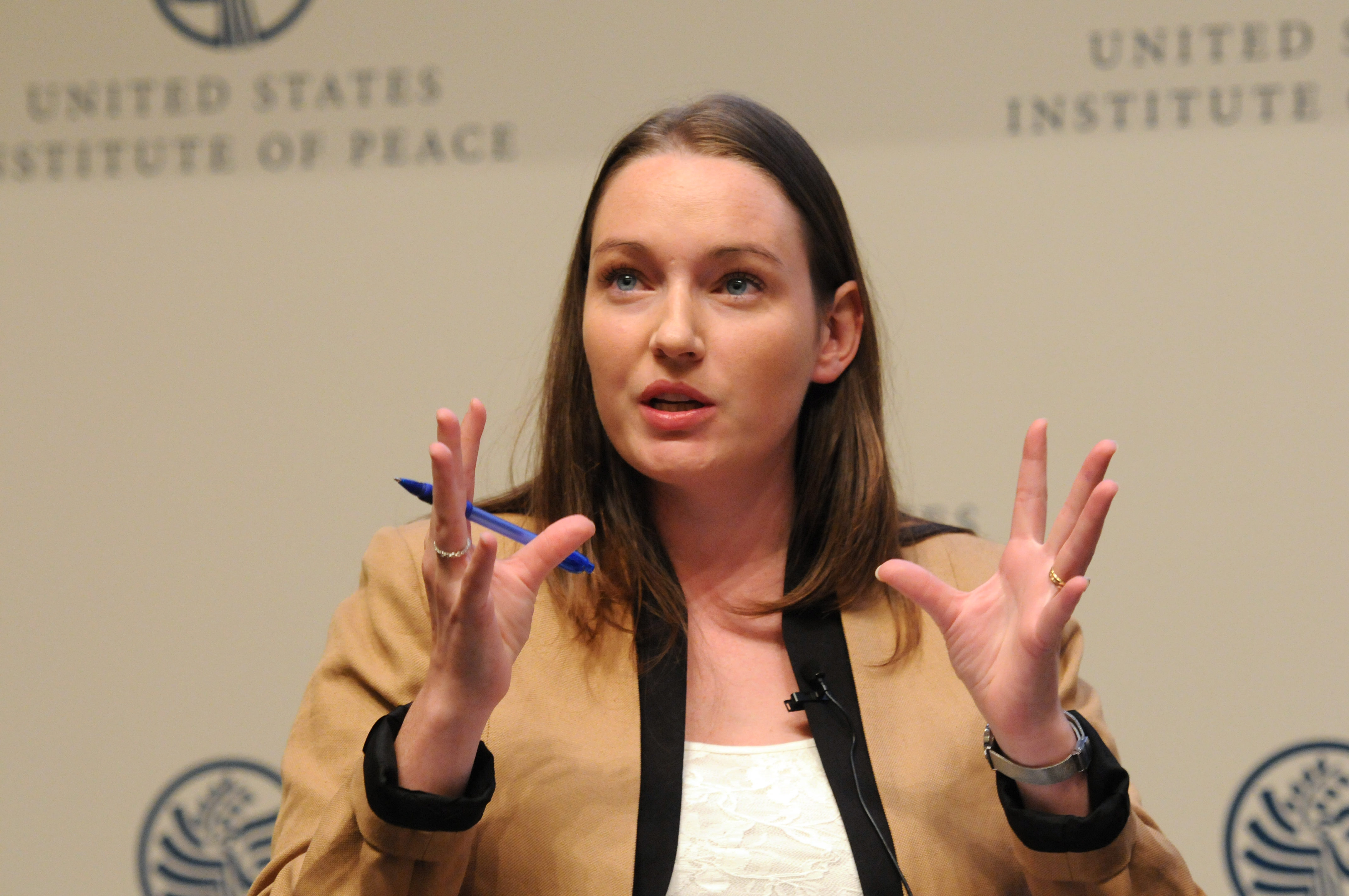 I went on to discuss two core areas of our work: demilitarism and gender equality. From nuclear disarmament and advocating for a gender sensitive Arms Trade Treaty, to WILPF members calling on governments to reform structural violence and decrease military spending, WILPF connects and challenges cultures of masculinities, power, and state violence. Read more about the conference and other happenings addressing links with gender, masculinities and men below.
I went on to discuss two core areas of our work: demilitarism and gender equality. From nuclear disarmament and advocating for a gender sensitive Arms Trade Treaty, to WILPF members calling on governments to reform structural violence and decrease military spending, WILPF connects and challenges cultures of masculinities, power, and state violence. Read more about the conference and other happenings addressing links with gender, masculinities and men below.
From November 5-7, PeaceWomen participated in the first Global Review on NAPs, which focused on building accountability for National and Regional Implementation, hosted by UNWomen. The three day meeting discussed current NAPs, lessons learned and recommendations. Given our work in WILPF sections and PeaceWomen's monitoring on NAPs, I participated to share our recommendations and ask critical questions. WILPF-Nigeria President Joy also participated and shared lessons learned from the Nigerian NAP process which should have been more inclusive (more details below). PeaceWomen also participated in an OSCE/UNWomen conference in aty, Kazakhstan on “Enhancing the Women, Peace and Security Agenda in the Euro-Atlantic and Eurasian Region.” Abigail Ruane presented WILPF recommendations to build civil society capacity and access in order to bridge key gaps left by governments, especially towards promoting demilitarization and disarmament and promoting positive and sustainable peace. These recommendations were taken up in the conclusions of the conference.
We also join with many women, peace and security advocates in welcoming the comprehensive General Recommendation on women in conflict prevention, conflict and post-conflict situations adopted in October by the Committee on the Elimination of Discrimination Against Women (CEDAW Committee). 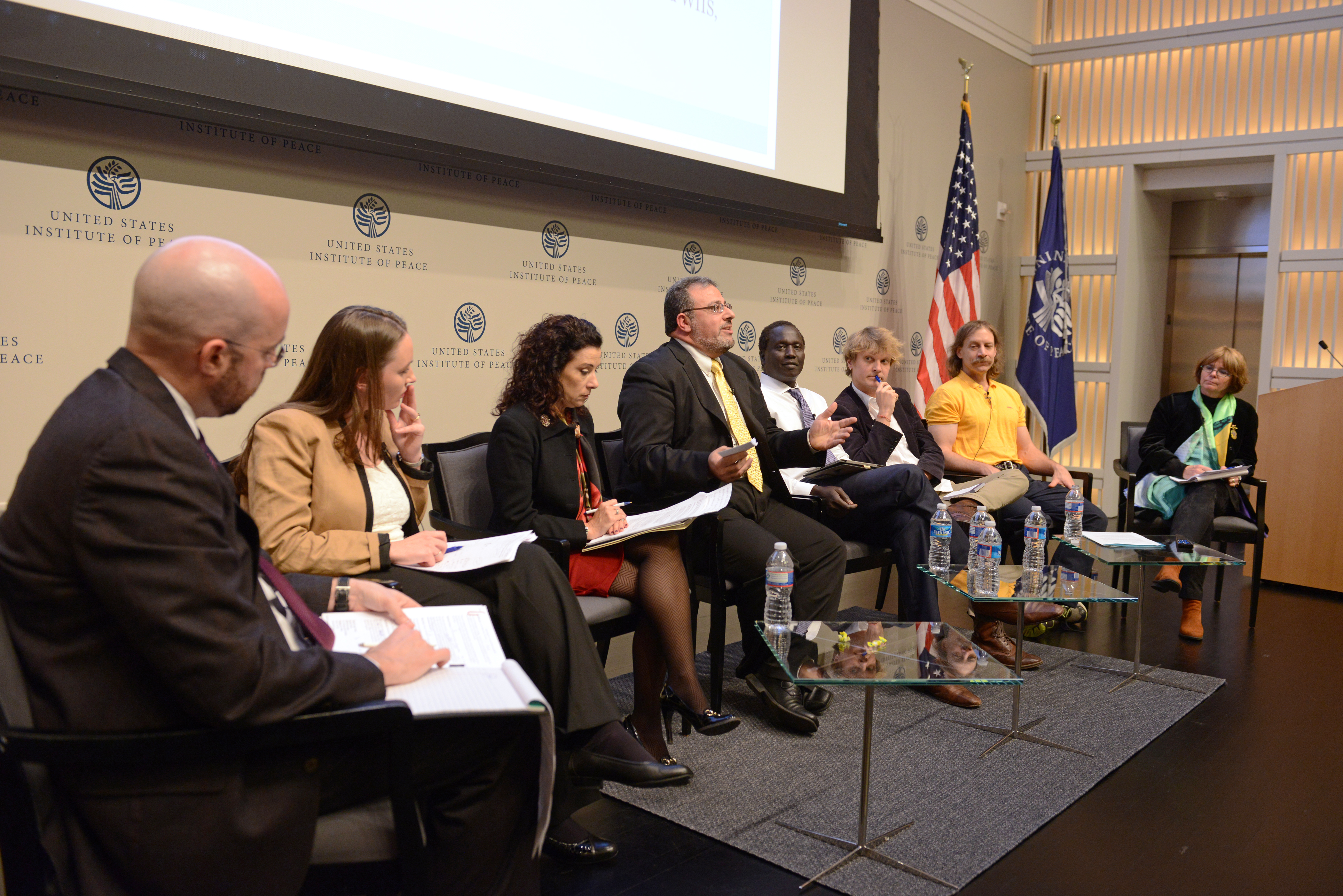 Read our blog on how the General Recommendation incorporates the WILPF integrated approach.
Read our blog on how the General Recommendation incorporates the WILPF integrated approach.
This month, we featured a special article on Colombia given the ongoing Peace Process, recent Summit on Women, Peace and Security, and leading work of WILPF Colombia. An agreement between the Government and the FARC-EP on political participation noted that everything that was agreed to with regard to political participation, including its implementation, would be carried out keeping in mind a gender focus and guaranteeing the participation of women.
Read more in this edition about the situation in Syria, including WILPF Secretary General Madeleine Rees' response to UK announcement, and Anne-Marie Goetz's Lecture on opportunities and challenges.
Through piecing together the bigger picture, PeaceWomen hopes to translate our work and actions into transformative change.
Engaging Men in WPS
PeaceWomen participated in several events on Men, Peace and Security in the last month, which we covered on our social media. “Gender roles are dynamic and peace and security are gendered”, stated one of our many tweets from the Men, Peace and Security Symposium (Washington DC). The Symposium offered an important time to discuss an often silent aspect of SCR 1325: gender relations, masculinities and engaging men. The discussions and panels attempted to apply the lens of gender to the broader issues surrounding peace and security, and understand how the ascribed norms of men and masculine identities contribute to, and could help mitigate violent conflict and post- conflict.
conflict.
The second event entitled “Taking UNSCR1325 to The Next Level: Mainstreaming, Masculinities And Movements” (held at Netherlands Mission to UN in New York), similarly emphasised the need to engage men and incorporate masculinities into the Women, Peace, Security agenda. Speakers emphasised the need to utilise the language of “masculinities and femininities” rather than “men” and “women” in order to highlight the social constructivist nature of gender behaviour embedded in global gender power relations. Moreover, all of the speakers reiterated how crucial women's empowerment and participation are for the effectiveness of DDR(Disarmament, Demobilisation and Reintegration), security sector reform, and economic recovery.
Click here to read our coverage of PW's participation at MPS events.
Women, Peace, Security: Looking Ahead to 2015
On Monday, November 18th, 2013, PeaceWomen, along with the Mission of Liechtenstein and Princeton University, hosted the eleventh panel of our Women, Peace and Security lecture series, titled “Women, Peace, Security: Looking Ahead to 2015”, with keynote speaker Ms. Anne-Marie Goetz, Chief Advisor for Peace and Security, UNWomen. In her discussion of her findings from the Global Review of the Regional and National Action Plans, Goetz addressed several gaps and challenges. Goetz affirmed a gender perspective being missing in key areas such as conflict prevention and decision-making. A main problem area identified was the detrimental connection made between self-determination and nationalism, and how NAPs actually risk contaminating the original intent of 1325 by diluting it with nationalist aims. 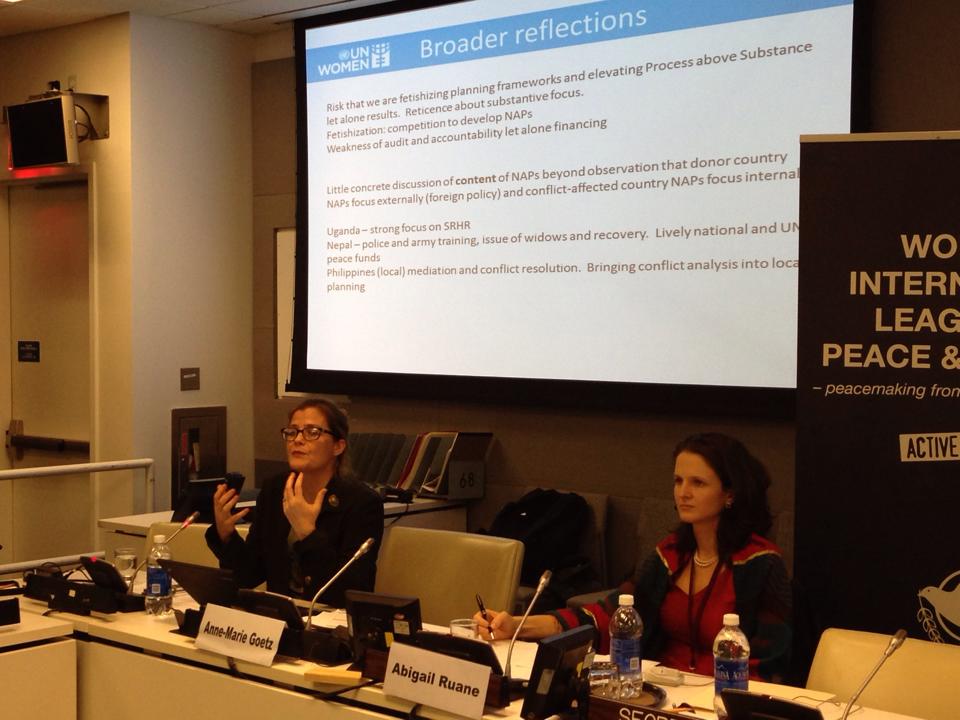 Further, she noted that the UN has primarily focused on the process rather than the substantive content of NAPs. She also stressed the crucial involvement and engagement of civil society in national action planning around WPS in order to strengthen legitimacy and accountability for implementation.
Further, she noted that the UN has primarily focused on the process rather than the substantive content of NAPs. She also stressed the crucial involvement and engagement of civil society in national action planning around WPS in order to strengthen legitimacy and accountability for implementation.
To address these gaps and challenges, Goetz also touched on recommended responses in looking ahead to 2015 and beyond. Viewing sustainable development and Post2015 processes as a key political opportunity for moving the WPS agenda forward, she emphasized the need to integrate WPS directly in these discussions. Goetz underscored again the significant role of civil society and women's organizations, and stressed capacity-building in order to build effective constituencies. She also cited recent normative movements in UNSCR 2122 and CEDAW GR 30 as important tools and developments in moving forward, with both addressing the ongoing challenge of capacity-building. In particular, the de-linking of self-determination and nationalism, and the bridging of self-determination and conflict prevention, was what Goetz stated was essential when thinking about WPS post-2015.
PeaceWomen Participates in NAP Global Review
PeaceWomen participated in the Global Review on NAPs from 5-7 November. The aim of the meeting was to invigorate and generate momentum for scaling up good practices and applying more effective strategies for implementation of the women, peace and security resolutions at national and regional levels. Attendees included 40-50 technical level experts and representatives of Member States, regional organizations, UN and civil society organizations, and academics involved in implementation strategies. Representing WILPF were WILPF Nigeria's President Joy Onyesoh and PeaceWomen Director, Maria Butler.
The three day meeting discussed current NAPs, lessons learned and recommendations. Discuss groups addressed: the NAP development process, approaches to implementation, financing and resource allocation, and discussed questions such as: “how can the international community emphasis the critical and indispensable importance of developing robust revision plans and procedures in every action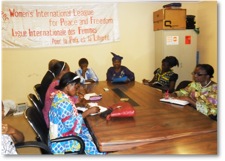 plan?” and “how can monitoring engage more results-oriented benchmarks?” and “how can NAPs better focus on prevention and participation?” Three background papers were produced on building accountability for NAP implementation, NAP localization, NAP financial allocation.
plan?” and “how can monitoring engage more results-oriented benchmarks?” and “how can NAPs better focus on prevention and participation?” Three background papers were produced on building accountability for NAP implementation, NAP localization, NAP financial allocation.
PeaceWomen's work on NAPs continues to be strengthened. PeaceWomen's NAP Initiative provides the tools and coordination needed to strengthen and amplify civil society voices and analysis. Check out our comprehensive online database (linked below) for monitoring and evaluation (M&E) searchable by country or index to explore key issues including NAP indicators, budgets, goals, and civil society engagement. PeaceWomen's WPS 2013 mobile app includes a special section on NAPs with key information. In preparation of the Global Review, PeaceWomen also collaborated with UNWomen, Global Network of Women Peacebuilders and the Institute for Inclusive Security who just launched Resolution to Act Initiative on Resolution 1325.
Click here for our overview of our NAP work and three key objectives.
WILPF Section Members Participate in Colombia Peace Movement
Since the announcement of peace talks in Colombia between the Colombian Government and the FARC-EP in 2012, slow developments have been taking place in relation to the participation of women and inclusion of a gender perspective. The National Summit of Women and Peace, which took place on October 23rd in Bogota, offered a platform for women to discuss the signing, implementation and checking of any agreements. About 400 Colombian women belonging to diverse political and ethnic backgrounds and organizations, including WILPF-Colombia members, participated in the event.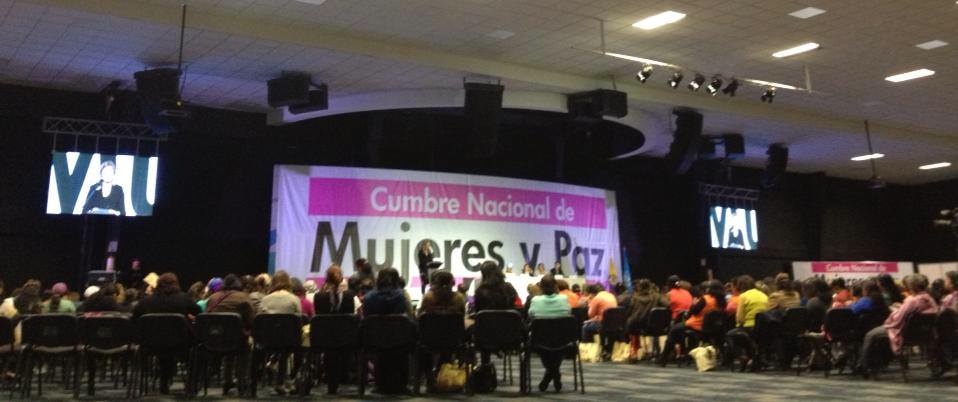
Manuela Mesa from WILPF-España, along with other international experts, spoke on a Panel on peace-building, where they stressed the importance of considering women not just as victims, but rather as active political agents capable of facilitating peace.
In Havana, the stalled negotiations got back on track and the latest agreement included women, peace and security language. The Joint Accord on Political Participation released on November 6th stated that everything that was agreed to with regard to political participation, including its implementation, would be carried out keeping in mind a gender focus and guaranteeing the participation of women.
Click here to read PeaceWomen's full summary of recent events in the Colombia peace movement.
